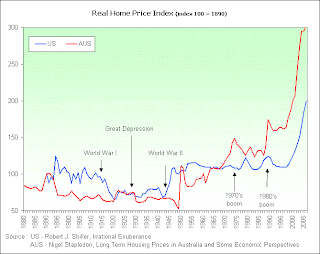Big Bangs & Why You Still Shouldn't Buy a House
Following on from why not to buy a house, I can highly recommend Steve Keen's blog at: http://www.debtdeflation.com/blogs/ (Have a look at his graphs showing the debt levels in Australia ovcer the past 100+ years, and you'll see what it is that's been funding those huge hikes in house prices. The houses certainly didn't suddenly become worth 3 to 4 times as much - people weren't wall papering with gold leaf). Keen has been one of the few sane voices talking about the insanity of our 'economy' over the past 10 years or so. To this day he's despised or ridiculed by most traditional economists, because they don't have the slightest clue where he's coming from. If you have even a passing interest in economics though, and all of us do in a way because it's become a standard item in most news bulletins, and you read Keen's work and others of the same mind, you'll wonder what planet the other economists came from. There are almost too many





